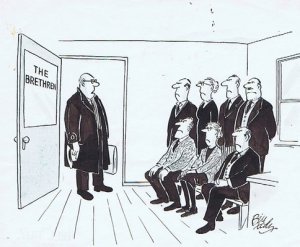15th December 1945. On the Seventh Day…
Sir Toby Belch in Shakespeare’s Twelfth Night: ‘Fool! Dost thou think because thou art virtuous there shall be no more cakes and ale’?
Various Lord’s Day Observance [Puritanical] Acts from 1625 to 1780, and later influences, cast a blight over Britain, to be felt until comparatively recent times. In effect this banned all entertainment or merriment on Sundays.
Today in 1945 an article in the London Evening Standard by George Orwell reflected on the need to attract foreign tourists to build up our exchange rate and economy after World War II.(1)
He said their were two problems: ‘the gloom of Sundays and difficulty buying a drink’ on that day. Which brings us to the very British problem of the way we have regarded Sundays.
A continental visitor commented in the reign of Victoria about Cheapside, London and, ‘wishing for a glass of ale or a claret found everywhere hermetically sealed, and even the front door of his hotel was locked’.
Arthur Clennam in Dickens’ Little Dorrit, returning from abroad, found ‘melancholic streets in a penitential garb of soot. Everything was barred and bolted, nothing for the spent toiler… and the toiler was enabled to compare the monotony of the seventh day with the monotony of his six’.

You have to do better than that in your next away match with the Lord’s Day Observance Society on Sunday.
In reaction, an 1836 Pamphlet in favour of Sunday Trading was published, against the Fourth Commandment. It was written by ‘Timothy Sparks’, a pseudonym of Charles Dickens, which led to the National Sunday League, to combat the rise of the founding in 1831 of the Lord’s Day Observance Society (LDOS).
The LDOS was the result of a fervent Evangelical, Islington vicar, which quickly became a powerful force owing to the influential people it attracted and societal pressure it exerted.
It was a tone still influencing the likes of BBC’s Director-General, John Reith, when pre-war Sunday broadcasts didn’t start until the afternoon in order not to compete with religious worship and then to have a respectful tone. Even one of Gustave Holst’s songs was considered too boisterous for Sunday night broadcasting.
Sabbatarian pressure resulted in complicated pub licencing and shop opening times- the Sunday Trading and Licencing Laws-which were relaxed in the 1994 and 2005 Acts.(2)
Enjoy your ‘whole’ weekend!
(1) Orwell wrote ‘1984’ amongst other novels.
(2) Premises of over 3,000 sq ft are restricted to six hours of Sunday opening.
Ref: Brief History of Life in Victorian Britain. Michael Paterson. 2013.
Ref: lordsdaysabbath.org
Ref: Orwell Essays and Diaries.George Orwell
Ref: independent.co.uk/sunday-trading-laws-awake-puritans-in-england. Sat.11.7.2015.
Ref: branchcollective.com/Pic.